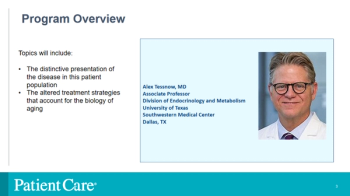
Alex Tessnow, MD, reviews treatment approaches for elderly patients with hypothyroidism.

Alex Tessnow, MD, reviews treatment approaches for elderly patients with hypothyroidism.

Alex Tessnow, MD, discusses the common symptoms and red flags associated with hypothyroidism in elderly patients.

Alex Tessnow, MD, highlights the variability of hypothyroidism among elderly patients.
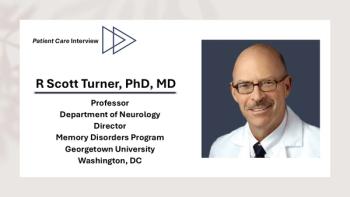
Dr Turner reviews the profile of the individual who is most likely to benefit from lecanemab therapy.

Professor MeiLan Han, MD, MS, details inclusion of the 2 new medications and how the additions reflect a focus on disease heterogeneity and precision medicine in in COPD.

Georgetown University memory disorders expert R Scott Turner, PhD, MD, reviews the science behind approval of lecanemab for monthly maintenance dosing of lecanemab.
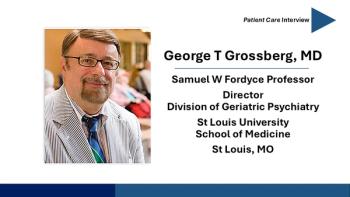
When a patient with Alzheimer dementia becomes agitated, check the physical environment for a trigger before pulling the trigger on a medication, dementia expert George Grossberg, MD, recommends.

The revolutionary medications are the first new treatments for Alzheimer disease to be approved in more than 20 years and the first-ever disease-modifying drugs.

Cardiovascular comorbidities in adults with COPD are linked to poor outcomes including reduced QoL, increased hospitalizations, and greater risk of mortality, Han explains.

COPD expert MeiLan K Han, MD, MS, says that in the absence of a definitive single tool to assess for COPD, probing patients for risk factors and symptoms is essential.

Encouraging patients to reach out with questions may lead more to roll up their sleeves this season, Tochi Iroku-Malize, MD, told Patient Care.
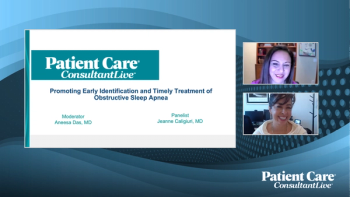
Panelists discuss how real-world patient cases demonstrate the importance of individualizing obstructive sleep apnea treatment plans by considering factors such as disease severity, comorbidities, lifestyle, and patient preferences to optimize outcomes.

Panelists discuss how treatment options for obstructive sleep apnea include positive airway pressure therapy, oral appliances, lifestyle modifications, and surgical interventions, with the choice depending on disease severity and patient preferences.

Panelists discuss how positive airway pressure therapy is the most effective treatment for obstructive sleep apnea, with optimal outcomes dependent on proper device settings, mask fitting, and patient education to improve adherence.

The GOLD report committee member highlights advances in knowledge of COPD phenotypes and the new role for biologic medications in this year's video series.

Shagun Bindlish, MD, board member of the American Diabetes Association, discusses a recent clinical practice statement she coauthored published in the journal Obesity Pillars.
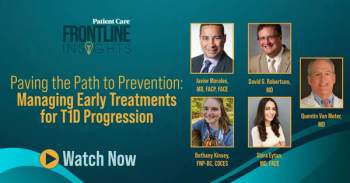
Panelists discuss how early identification of Type 1 diabetes through screening programs, combined with emerging therapies like teplizumab, offers new opportunities for intervention and improved patient outcomes in at-risk populations.

Panelists discuss how patient selection for teplizumab therapy requires screening for specific autoantibodies and stages of Type 1 diabetes, followed by a standardized 14-day outpatient infusion protocol with careful monitoring for side effects.

Panelists discuss how teplizumab, the first FDA-approved disease-modifying therapy for Type 1 diabetes, can delay disease onset by targeting CD3+ T cells and preserving beta cell function in high-risk individuals.

Panelists discuss how islet autoantibody testing serves as a critical screening tool for identifying Type 1 diabetes risk, with tests detecting antibodies against insulin, GAD65, IA-2, and ZnT8 proteins being the most clinically validated markers.
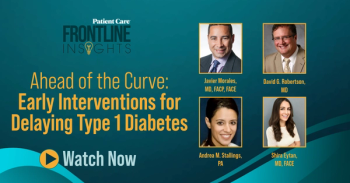
Panelists discuss how patient selection for teplizumab therapy requires careful screening for autoantibody positivity and preserved C-peptide function, followed by a 14-day outpatient infusion process that needs close monitoring for cytokine release syndrome and other potential adverse effects.

Panelists discuss how teplizumab demonstrated efficacy in clinical trials by delaying type 1 diabetes onset in high-risk patients.

Panelists discuss how teplizumab binds to T cells and modifies their function to preserve beta cell function, potentially delaying type 1 diabetes onset in at-risk individuals by an average of 2-3 years.

Panelists discuss how screening for autoantibodies can help identify individuals at risk for type 1 diabetes before symptoms develop, enabling earlier intervention and potentially delaying disease onset.

A geriatric psychiatrist talks about the importance of asking caregivers about behavior in order to understand and treat agitation in Alzheimer dementia.

Caissa Troutman, MD, shares 3 key strategies for managing hypertension in patients with obesity in primary care.

An expert discussion with JoAnn Pinkerton, MD, national lead for the OASIS clinical trial program of elinzanetant for moderate-to-severe VMS.

Panelists discuss how validated questionnaires, clinical assessment tools, and overnight monitoring devices can help identify patients at risk for obstructive sleep apnea, though polysomnography remains the gold standard for definitive diagnosis.

Panelists discuss how various obstacles impede obstructive sleep apnea diagnosis, including limited access to sleep studies, lack of patient awareness, high costs, long wait times for testing, and inconsistent screening practices among health care providers.

Caissa Troutman, MD, stresses the importance of building trust with patients through active listening and consistent, non-judgmental communication.